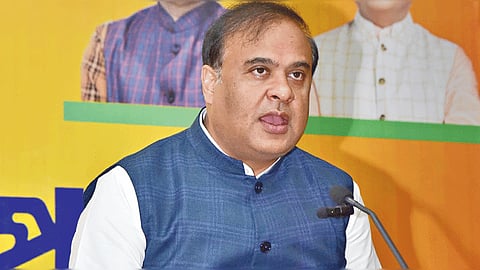
- Home
- Live Blog
- Breaking News
- Top Headlines
- Cities
- NE News
- Sentinel Media
- Sports
- Education
- Jobs

GUWAHATI: While protests against the Waqf (Amendment) Act, 2025 continue to sweep the nation, Assam Chief Minister Himanta Biswa Sarma has given a stern message dissuading demonstrations in the state.
He warned that street protests may lead to clashes and instead urged agitators to approach the Supreme Court with their grievances.
The Waqf (Amendment) Act, 2025, is designed to make the administration of Waqf property more streamlined, solve complex legal issues, bring in greater transparency, and adopt technology-based management approaches. Yet, it has also triggered opposition and criticism in many places, including Assam.
Talking to the media persons, CM Sarma underlined the need for keeping the state peaceful. "The matter is before the Supreme Court. If anybody has something to say, kindly put it before the top court as it can be sorted out there," he asserted.
He cautioned that if people hit the streets against the Act, those who support the Act may also come on the streets, and it can result in confrontation.
Referring to the All Assam Minority Students' Union (AAMSU), Sarma stated that opposition to the Act is a democratic right, but it should be done through legal means. "We don't want any conflict. Brotherhood should be maintained for the development of Assam. If anyone wants to oppose the Waqf Act, I would advise them to go to the Supreme Court. Those who support the Act should also do the same," he further added.
Tensions have already escalated in the Cachar district, where a protest against the Act became violent. Protesters allegedly hurled stones at the police, with the police subsequently charging with batons.
Subsequently, the Cachar administration issued prohibitory orders under Section 163 of the Bharatiya Nagarik Suraksha Sanhita (BNSS) in the interests of maintaining order.
The modified Act brings in a major change in the manner in which disputes regarding Waqf properties are dealt with. An officer with a rank higher than that of a collector will now investigate such claims, and in the event of disputes, the official would have the last word on deciding whether the land is of the Waqf or the state. This takes the place of the previous Waqf tribunal mechanism.
In an effort to ensure inclusivity, the Act also allows for the inclusion of non-Muslim members in central and state Waqf boards, a significant departure from previous practice.
ALSO WATCH: